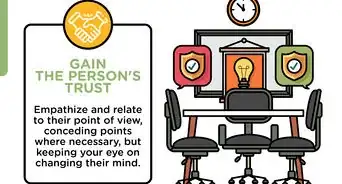This article was co-authored by Guy Reichard and by wikiHow staff writer, Janice Tieperman. Guy Reichard is an Executive Life Coach and the Founder of HeartRich Coaching & Training, a professional life coaching and inner leadership training provider based in Toronto, Ontario, Canada. He works with people to create more meaning, purpose, well-being, and fulfillment in their lives. Guy has over 10 years of personal growth coaching and resilience training experience, helping clients enhance and transform their inner worlds, so they can be a more positive and powerful influence on those they love and lead. He is an Adler Certified Professional Coach (ACPC), and is accredited by the International Coach Federation. He earned a BA in Psychology from York University in 1997 and a Master of Business Administration (MBA) from York University in 2000.
There are 11 references cited in this article, which can be found at the bottom of the page.
This article has been viewed 54,236 times.
Whether you’re asking your parents for a little extra cash or discussing a raise with your boss, saying “please” isn’t always enough to seal the deal. Mind control definitely isn’t an option, so how are you supposed to get what you want from people without burning bridges in the process? We’ve got you covered. Keep reading for plenty of tips, tricks, and conversational hacks that can give you a great shot at getting exactly what you want.
Steps
Fool them into thinking your idea is theirs.
-
It’s harder for people to say no when they think something was their idea. Present your idea like a descriptive story instead of framing it like a question. Set the scene in clear, vivid detail, so your request can get a life of its own in the other person’s mind. Look for ways to really connect and relate the request to the other person. With any luck, they might “suggest” your idea at the end of the conversation.[1] X Research source Here are a few examples of how that conversation could go down:
- A new video game system: “I really wish we could spend more time together as a family. I know we do the occasional movie night, but I feel like our TV isn’t living up to its potential. We all have some free time on Friday night—I feel like that could be a great chance to have a regular family video game night.”
- An upgrade at work: “There’s so much clutter in the break room that it’s hard to know what belongs to who. Imagine if we had labeled cubby shelves installed—it would be so much easier to find what we’re looking for.”
Make your case really quickly.
-
People may not process what you’re saying if you speak really fast. In one study, participants listened to people share both popular and unpopular opinions at slow, moderate, and fast speaking speeds. Overall, participants were less likely to debate unpopular opinions that were shared quickly.[2] X Research source Add that logic to your own persuasive toolkit by making your case as quickly as possible.
- In the study, “fast speech” was considered 214 words per minute or faster.[3] X Research source Try doubling your normal speaking speed and see if you can reach that level.
Confuse them into agreement.
-
State your request in a confusing way, and then rephrase it in a simple way. Wording something confusingly will take the other person off-guard, so simplifying your request may win them over. In fact, research shows that sellers who used this technique made twice as many sales as sellers who offered a traditional pitch to customers.[4] X Research source Here’s a way you can apply this technique in regular conversation:
- “Hey Dad! I need 40 quarters for this thing I’m doing later. Actually, a $10 bill will work too.”
- “Would I be able to use 36 hours of vacation time next week? Or would 2 days be easier?”
Ask for more than you actually want.
-
This salary negotiation trick can apply to other situations. During salary negotiations, a common strategy is asking your superior for a higher salary than you’re actually expecting to get—this way, you’re still happy with the final amount you both settle on.[5] X Research source Apply this strategy to your everyday life by asking for more than you actually need from people. You might:
- Ask a friend for $20 when you only need $10
- Ask to extend your curfew to 1 AM when you only need it extended to midnight
- Request a co-worker cover your full shift when you only need half of it covered
Make your request when the other person is tired.
-
A tired, less alert person may be more willing to comply. Someone running on fumes definitely isn’t going to be on their A-game, and probably won’t be engaged in your conversation.[6] X Trustworthy Source Cleveland Clinic Educational website from one of the world's leading hospitals Go to source Use this window of opportunity to ask for what you want; with any luck, the person will be too tired or out-of-it to really process or care about what you’re saying, and may just go along with your request. A good time to ask could be:
- Right before bed
- At the end of a long work week
- First thing in the morning
Guilt them into saying yes.
-
Ask the person for multiple things that you know they’ll refuse. Then, ask them for what you really want. They might feel guilty about saying no to you before and agree to whatever you’re asking now.[7] X Research source
- For example, you might ask your parents if you can visit the city or go to a concert with your friends. If they refuse that, downgrade your request to something more low-key, like spending the night at a friend’s place.
Make your request time-sensitive.
-
The extra pressure might help you seal the deal. Play to the other person’s sense of FOMO (Fear Of Missing Out), and make your request sound like a rare opportunity. Making your request time-sensitive might be enough to get the other person on-board.[8] X Research source You could:
- Ask your parents to buy you something that’s on sale
- Ask your boss for the chance to go to an annual conference
- Ask a friend to see a popular band on tour with you
Do a favor for the other person.
-
Doing someone a favor gives you the opportunity to cash in on a favor later. Give the person a reason to help you out by doing something for them first. By building rapport, the other party might be more willing to agree to your future requests.[9] X Research source You might:
- Treat a co-worker to coffee
- Do extra chores around the house
- Help a classmate with a last-minute assignment
Give the person an out.
-
Easing off the pressure might make someone more willing to help. Let the other person know that you appreciate their consideration, and that you understand if they don’t have the time or interest in helping you at the moment. The other party might appreciate the kind gesture and help you anyway.[10] X Research source Here are a few ways to tone down your request:
- “I completely understand if you’re busy, but I appreciate your consideration regardless.”
- “I know that this is last-minute, and I understand if you don’t have the time.”
- “You won’t hurt my feelings if you say no.”
Offer a compromise.
-
Getting at least part of what you want is better than nothing. Compromises can come in all shapes and sizes—maybe you each do each other a favor, or maybe you both find a way to meet each other halfway. Look for a resolution that works for both of you in the long-term, so no one is left disappointed. You might say:[11] X Research source
- “Would it be okay if I took the lead on this assignment and you took the lead on the next one?”
- “I’ll let you choose the restaurant this go-around if you let me choose it next time?”
- “Could we split the bill on this?”
Write out your request.
-
People respond more positively to written notes of request. Instead of striking up a conversation, jot down your request on a sticky note and leave it somewhere the other person will find it. Some research shows that people are more willing to help a written request as opposed to a verbal one.[12] X Research source You might write:
- “Hey Liam! Hope you’re having a good day. I’m so sorry to bother you, but would you mind grabbing me a cup of coffee from the break room? I’m out at the doctor’s this morning and won’t have time to grab a coffee on my way into work.”
- “Hey Mom! Would you mind sticking a few snacks into my lunch bag for the day?”
Mirror their body language.
-
People tend to like you more when you copy their body language. Also known as the “chameleon effect,” body language mirroring is a clever way to make a positive impression without having to say a word. Just pay attention to what the other person is doing: do they use a specific type of body language or stand with a specific posture? Whatever the case, subtly imitate them to the best of your ability as you make your request.[13] X Research source
- If they’re twirling a piece of their hair, twirl a section of your own hair.
- If they’re standing with their shoulders back and chest out, stand the same way yourself.
Stay positive if it doesn’t work out.
-
Making a scene won’t boost your shot at getting what you want. Besides, getting rejected doesn’t mean that you’ll never get what you want. Handle each conversation with grace and good manners, even if you aren’t happy with the result. Just be patient and look for an opportunity to make another request in the future.[14] X Research source
- If you act immaturely, the other person may not be willing to listen to whatever you have to say on another occasion.
Community Q&A
-
QuestionHow can I earn respect?
 TheRedNinjaCommunity AnswerBy being respectful, you can earn respect from other people.
TheRedNinjaCommunity AnswerBy being respectful, you can earn respect from other people. -
QuestionI want to ask someone to help me pay my bills. How do I do it?
 Community AnswerGo ahead and ask. You don't have to be scared or worried because the worse that will happen is that they say, "No."
Community AnswerGo ahead and ask. You don't have to be scared or worried because the worse that will happen is that they say, "No." -
QuestionHow do I ask someone for something I want without having to hear the word no?
 Community AnswerYou can never completely control what a person may say, but explaining exactly why they shouldn't say no without being too direct can get similar results.
Community AnswerYou can never completely control what a person may say, but explaining exactly why they shouldn't say no without being too direct can get similar results.
You Might Also Like














References
- ↑ https://www.businessinsider.com/heres-how-you-trick-people-into-thinking-your-idea-is-their-own-2013-1
- ↑ https://journals.sagepub.com/doi/abs/10.1177/0146167291176009
- ↑ https://journals.sagepub.com/doi/abs/10.1177/0146167291176009
- ↑ https://dictionary.apa.org/disrupt-then-reframe-technique
- ↑ https://money.usnews.com/money/blogs/outside-voices-careers/articles/the-exact-words-to-use-when-negotiating-salary-in-a-job-offer
- ↑ https://health.clevelandclinic.org/happens-body-dont-get-enough-sleep/
- ↑ https://www.inc.com/christina-desmarais/how-to-get-people-to-say-yes-to-what-you-want-according-to-science.html
- ↑ https://www.fastcompany.com/3030173/how-to-use-10-psychological-theories-to-persuade-people
- ↑ https://www.businessinsider.com/tricks-for-getting-people-to-do-what-you-want-2016-11
- ↑ https://www.inc.com/christina-desmarais/how-to-get-people-to-say-yes-to-what-you-want-according-to-science.html
- ↑ https://www.psychologytoday.com/us/blog/evolution-the-self/201510/compromise-made-simple-7-handy-tips-couples
- ↑ https://www.inc.com/christina-desmarais/how-to-get-people-to-say-yes-to-what-you-want-according-to-science.html
- ↑ https://psycnet.apa.org/record/1999-05479-002
- ↑ https://www.psychologytoday.com/us/blog/fulfillment-any-age/201212/9-ways-ask-and-get-what-you-want
About This Article


























































